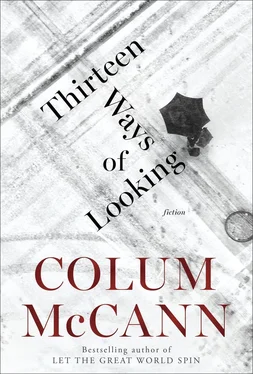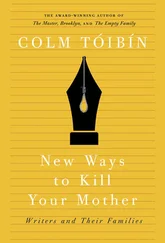Five yards along the car stops again and the door opens. His suit jacket swings in the wind. He steps over the curb, his hands above his head as if he might stop the rain.
The shop bell sounds again. The top of his shoes are wet and dripping. He stands, his face red, the veins in his neck shining. Something shifting and buzzing in his eyes.
He looks up at the shop ceiling, turns his back to the camera. So, he does not want to be seen, then. For how many years has he walked in this wilderness?
He leans forward, a sheen of sweat or rain on his brow, she can’t tell which. He hovers a moment close to her, his breath sharp in her ear.
— Puta, he whispers.
The word is immediately meek and useless. It grazes against her, dissolves, tumbles, something graceful even about its fall.
Beverly turns her back, steps toward the counter, the tea, her newspaper. No nerves in her fingers. No shake in her hands. She closes the final button of her blouse.
She is aware, now, exactly what sort of man he has become. No peace about him. No great swerve in his life. He has polished all his lies.
She could, now, do anything at all: arrange a conference, expose him to the newspapers, call him to task, let others know, create a revenge out of justice. But she will, she knows, just sit at the counter, slowly sip her tea, let the minutes pass, fold the newspaper, rise, leave the shop, shuffle down along the Thames, return to her brother’s flat, sit with him, talk, allow the night to fade away, and later she will slip into the warm bath, rise, towel, glance at the mirror, look away again, dress, sleep in the chair instead of the bed, listen to the evening tap against the windowpane, rise then, leave, return to Houston, a long flight across the Atlantic, a return, up the steps, those young girls, that small bakery of love and death.
There is a silence behind her, then she hears the sound of the shop door closing, a car door, an engine, and Carlos is gone.
Beverly runs her finger around the rim of the saucer, folds the newspaper, smooths out the creases, moves toward the cash register. Rows of cigarettes, lottery tickets, sweets. She slides the folded newspaper across the counter. She will leave the paper for the shopkeeper now, allow him to sell it again, why not: she has no more use for it.
She returns to her seat, ties her headscarf, lifts her coat into her arms.
The shopkeeper remains still, his hands spread wide. There is, she notices, a copy of the Qur’an near the register, thumbed, used. On a black-and-white television screen behind him, she sees the front door of the shop, the aisles of food, a small coin of baldness in the back of his head.
He has about him the air of a man prone to bruises and scars. There is a dark mark in the center of his forehead. A prayer bruise. She feels herself shiver. She has stepped into his world, showed herself immodest.
— Excuse me, sir?
— Madam?
— I’m sorry, she says.
— I didn’t see anything, Madam. I assure you. I did not see a thing.
She likes him for the quickness of the lie. She glances up at the ceiling camera.
— Those tapes?
— Yes?
— I don’t suppose you could give them to me?
— Excuse me?
— I wouldn’t like anybody else to see them.
He seems to ponder it a moment, weigh it. He reaches out and pats the newspaper on the counter, nods at her with a sharp cordiality.
— I’m afraid not. They record on the drive. There’s no actual tapes. I can’t give them to you.
He touches his hand to his chest where a row of pens sit in his shirt pocket.
— But nobody will see them, I promise you.
Beverly pulls the cardigan around her shoulders, hitches her coat, catches a glimpse of herself in the cubed screens, two or three versions, standing in the store, from the front, from behind, caught in the chorus of light and dark.
She steps through the shop, pauses a moment, spies the reflection of the shopkeeper in the window. At the cash register, the blinking red camera light above him is immutable, almost sacred.
— Thank you, she says without turning.
It is, she recognizes, an agreement of faith with a man whose name she does not even know.
She reaches for the door handle, pulls up the collar of her coat against the chill, steps out to the street and into the hard free fall of rain.
These stories were primarily completed in 2014 on either side of an incident that occurred in New Haven, Connecticut, on June 27, when I was punched from behind and knocked unconscious, then hospitalized, after trying to help a woman who had also been assaulted in the street.
Some of these stories were written before the assault and some of them were written afterward (for example, the punch in “Thirteen Ways” was dreamed up long before the incident, but Beverly’s recognition of her attacker in “Treaty” was written later).
Sometimes it seems to me that we are writing our lives in advance, but at other times we can only ever look back. In the end, though, every word we write is autobiographical, perhaps most especially when we attempt to avoid the autobiographical.
For all its imagined moments, literature works in unimaginable ways.
These stories have their own voices, but to learn more about their provenance, including the Victim Impact Statement from that incident in Connecticut, please go to my website, colummccann.com.
COLUM MCCANN is the internationally bestselling author of the novels TransAtlantic, Let the Great World Spin, Zoli, Dancer, This Side of Brightness, and Songdogs, as well as two critically acclaimed story collections. His fiction has been published in thirty-five languages. He has received many honors, including the National Book Award, the International IMPAC Dublin Literary Award, a Chevalier des Arts et des Lettres award from the French government, and the Ireland Fund of Monaco Literary Award in Memory of Princess Grace. He has been named one of Esquire ’s “Best and Brightest,” and his short film Everything in This Country Must was nominated for an Oscar in 2005. A contributor to The New Yorker, The New York Times Magazine, The Atlantic, and The Paris Review, he teaches in the Hunter College MFA Creative Writing program. He lives in New York City with his wife and their three children, and he is the cofounder of the global nonprofit story exchange organization, Narrative 4.
colummccann.com












